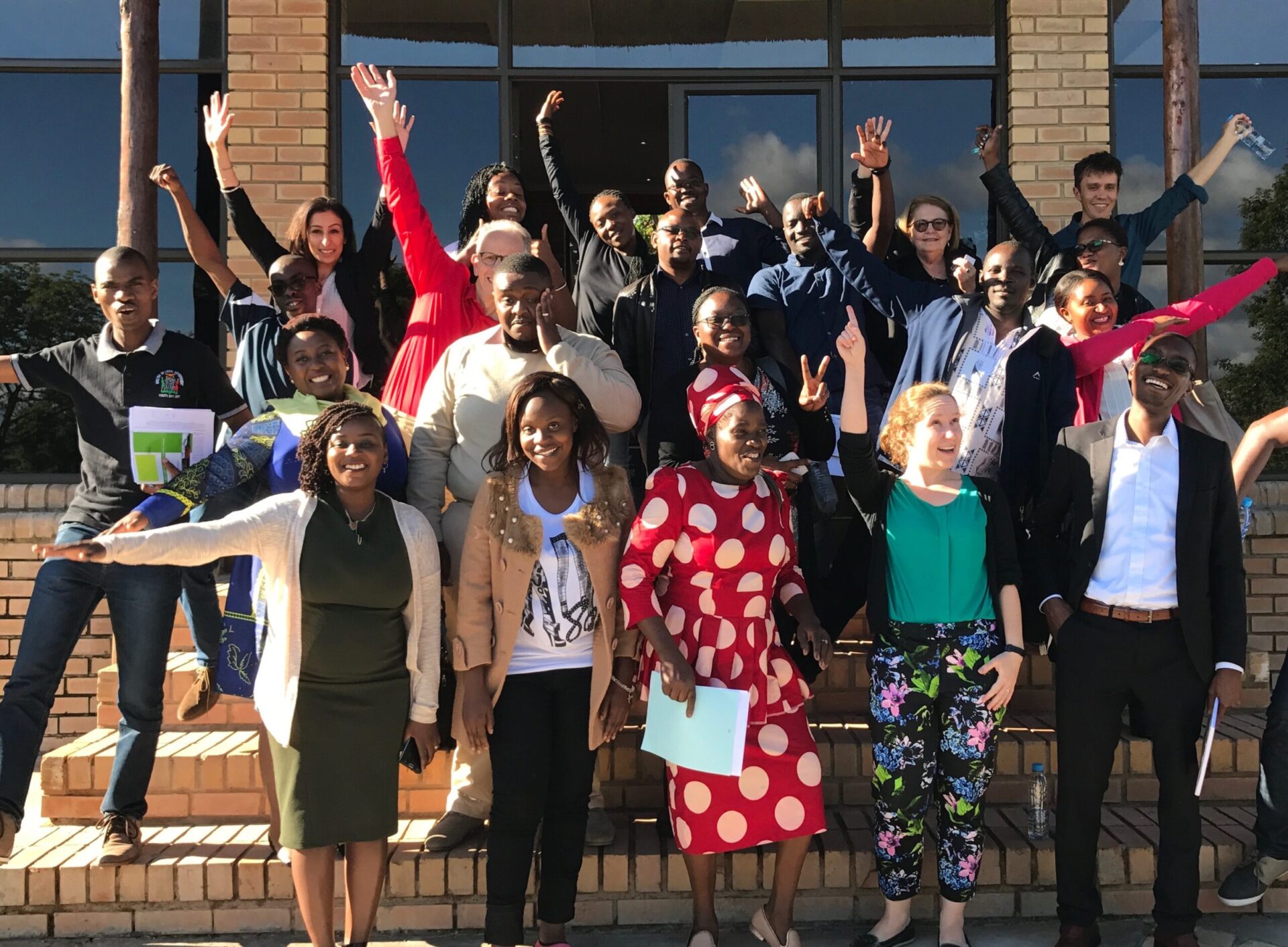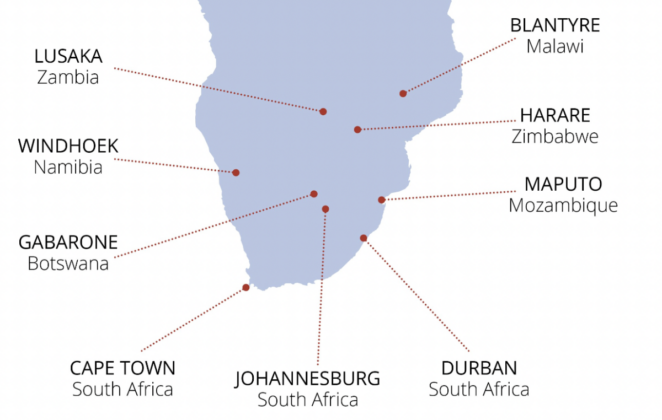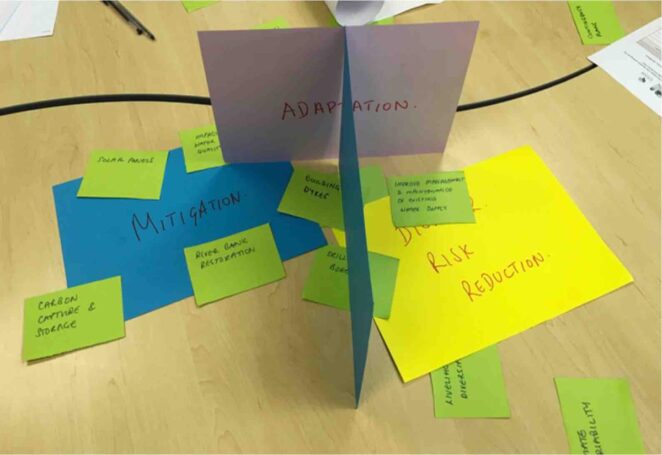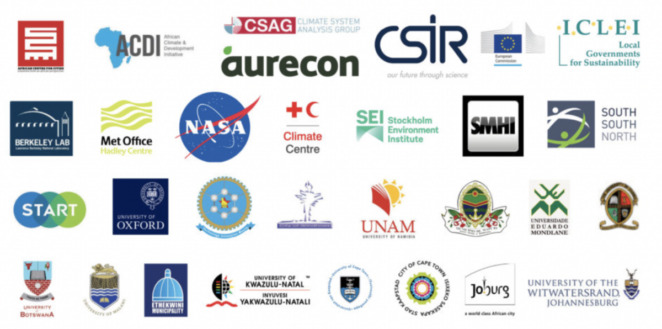FRACTAL: Future Resilience for African Cities and Lands

About FRACTAL
In the 21st century, addressing climate change necessarily includes building urban resilience by ensuring that people, infrastructure and economic activities are able to withstand and function well under a new set of conditions.
Africa’s future is dominated by a growing number of city residents. This, combined with climate change, creates complex climate risks and vulnerabilities, such as water scarcity, health threats, transport disruptions and electricity shortages, that connect cities with distant places they rely on (such as hydro-power plants in other districts or neighbouring countries). Climate change substantially complicates the development policy and planning landscape.
FRACTAL (initiated in June 2015) was a 4-year project coordinated by the Climate System Analysis Group (CSAG) at the University of Cape Town, with an 18 month costed extension (until March 2021) to explore the sustainability and scalability of knowledge co-production processes to strengthen urban climate resilience in Africa.
FRACTAL has been designed to work across disciplines within the scientific community and foster strong collaboration between researchers, city government officials and other key decision makers in southern Africa. The FRACTAL project operates in Windhoek, Maputo, Lusaka, Cape Town, Johannesburg, Durban, Blantyre, Gaborone and Harare.

FRACTAL’s aims
The decision-making challenges in Africa are aggravated by the lack of scientific climate information that is readily accessible and applicable at the city regional scale, and the fact that different climate models give contradictory scenarios for climate trends over the next 5–40 years. Through a transdisciplinary learning approach and scientific research FRACTAL is contributing to an improved understanding of climate processes, and regional and local climate trends that drive the southern African climate system’s natural variability and responses to change within that system.
The overarching aim of the FRACTAL project was to advance scientific knowledge about regional climate responses to human activities (such as burning fossil fuels or changing land surface cover) and work with decision makers to integrate this scientific knowledge into climate-sensitive decisions at the city-regional scale (particularly decisions relating to water, energy and food with a lifetime of 5 to 40 years).
Learning from and extending FRACTAL
Key learning themes and principles have emerged from phase 1 of the FRACTAL project. Key learning themes include:
-
Climate information distillation: Defined as ‘the extraction of the essential meaning and most important aspects of something’,distilling context-relevant, actionable, robust climate information at relevant decision-making scales from a plethora of sources has been key to the project. This concept has been further developed through experiences in cities, using Climate Risk Narratives (CRNs), and discourse analysis frameworks. Drawing on city learning experiences, a framework has been developed and tested to support transparent co-generation and development of meaning out of multiple sources of climate information for decision making.
-
Receptivity: The concept of receptivity emerged inductively through experiences in cities, with participants observing and reflecting on the benefits of hearing multiple perspectives during the learning labs and other engagements. Increased receptivity has been observed and expressed by many different participants of these processes; to understand the frames of reference for those contributing to decisions in cities, as well as the various forms of research disciplines. At a practical level, an example of receptivity was demonstrated during the “spilling the beans” game that was developed as an output of FRACTAL; various ways of understanding resilience were interrogated and shared.
- Transdisciplinary co-exploration and co-production for urban climate resilience: FRACTAL developed three key principles during the project: transdisciplinarity, co-production and co-exploration. Practical examples of transdisciplinary co-production during the first phase of FRACTAL include inter alia co-development of CRNs and city-specific CaDD processes. The Learning Labs in cities are examples of transdisciplinary processes, during which several knowledge outputs were co-produced. Transdisciplinary approaches such as Embedded Researchers and city government-research partnerships were developed during the project. In terms of co-exploration, several “aha” moments have occurred in labs between climate scientists and planners/decision makers that allowed new and better questions to be framed. Such moments also occurred through exercises such as terminology game, the use of a toolkit for developing a common language, the Analytic Hierarchy Process, systems mapping, role plays, climate information spectrum, unpacking climate information box etc.
All of the above mentioned Working Papers and Briefs can be found under the resources tab on the FRACTAL website. Many of the insights from the 1st phase of the FRACTAL project are brought together in the third issue of START’s ProSus Magazine under the title Building resilience in southern African cities.

FRACTAL-PLUS
The FRACTAL team successfully secured funding for a costed extension (October 2019-March 2021) to answer questions of scaling associated with transdisciplinary co-production for urban climate resilience in southern Africa, most notably those of sustaining and streamlining.
Through the activities proposed in the costed extension, the team aims to produce knowledge on inter alia:- Suggestions for scaling or replicating different transdisciplinary co-production approaches and techniques that have been implemented in the first phase of FRACTAL,
- Actions to enhance sustainability of climate resilience learnings from these techniques, and
- Potential indicators for monitoring the effectiveness of various transdisciplinary co-production and co-exploration processes.
Project Partners
FRACTAL consists of more than 70 researchers from partner organisations around the world. International research partners are shown below:

Partners from each city in FRACTAL are:
|
Academic city partners: |
City partners: |
|
University of Zambia |
Lusaka City Council |
|
University of Namibia |
City of Windhoek |
|
Eduardo Mondlane University |
Maputo Municipal Council |
|
University of Cape Town |
City of Cape Town |
|
University of KwaZulu Natal |
eThekwini Municipality |
|
Chinhoyi University of Technology |
|
|
University of Botswana |
|
|
Malawi Polytechnic |
FRACTAL is funded by the UK’s Department for International Development (DfID) and Natural Environment Research Council (NERC) through the Future Climate for Africa (FCFA) programme (see synthesis of findings of an evaluation of the FCFA programme).
Read some outputs from FRACTAL:
- Principles for co-producing climate services: practical insights from FRACTAL
- FRACTAL Principles (brief)
- Building Resilience in African Cities: A Think Piece
- Dialogue for decision-making: unpacking the ‘City Learning Lab’ approach
- FRACTAL Learning – Adaptation Inspiration Modules
- An Embedded Researcher approach to integrate climate information into decision making in southern African cities: lessons from FRACTAL
- Receptivity and judgement: expanding ways of knowing the climate to strengthen the resilience of cities
- Embracing the uncomfortable silences in climate information exchange
- Bottom-Up Adaptive Decision-Support for Resilient Urban Water Security: Lusaka Case Study
- Supporting climate-resilient urban planning: 10 lessons from cities in southern Africa
Read about related FCFA projects:
- AMMA-2050 (African Monsoon Multidisciplinary Analysis 2050)
- FRACTAL (Future Resilience for African Cities and Lands)
- IMPALA (Improving Model Processes for African Climate)
- HyCRISTAL (Integrating Hydro-Climate Science into Policy Decisions for Climate-Resilient Infrastructure and Livelihoods in East Africa)
- UMFULA (Uncertainty Reduction in Models for Understanding Development Applications)
(0) Comments
There is no content